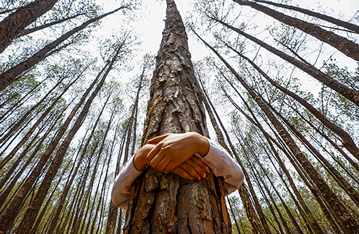Making room for ecological conversion this Lent
The world's vast deserts enjoy a reputation as arid, harsh, inhospitable places. Nonetheless, millions of people rather happily inhabit desert regions.
Mar 10, 2016

By David Gibson
The world's vast deserts enjoy a reputation as arid, harsh, inhospitable places. Nonetheless, millions of people rather happily inhabit desert regions.
Still, a familiar image from the annals of literature and films quickly comes to mind when the word "desert" is heard. It is an image of fearsome places where a person might well become hopelessly lost and where thirst and sandstorms prevail.
Increasing the size of our geographical deserts is no one's goal, I suppose. But it is the increasing size of deserts of another kind that has concerned recent popes. These deserts mirror the arid, dry qualities of the planet's geographical deserts, and they represent a major concern in Lent.
They are called "internal deserts." They stake out claims within people's lives, proving harmful to them and expanding their reach into the surrounding world.
That is why Pope Francis expresses concern about them in "Laudato Si'," his 2015 encyclical on the environment. "The external deserts in the world are growing because the internal deserts have become so vast," the encyclical states, quoting Pope Benedict XVI.
In his 2005 inaugural homily, Pope Benedict said that because internal deserts "have become so vast," the vast treasures of the earth "no longer serve to build God's garden for all to live in but they have been made to serve the powers of exploitation and destruction."
Pope Francis fears that "violence present" in human hearts gives rise to "the symptoms of sickness evident in the soil, in the water, in the air and in all forms of life." With his encyclical, he hopes to motivate Christians to "a more passionate concern for the protection of our world."
He strikingly affirms that "living our vocation to be protectors of God's handiwork is essential to a life of virtue; it is not an optional or a secondary aspect of our Christian experience."
Does it sound strange to hear care for the environment described that way, as a key concern for Christians? Cardinal Peter Turkson, president of the Pontifical Council for Justice and Peace, discussed this in a Jan. 27 speech prepared for the International Eucharistic Congress in Cebu, Philippines.
The sacraments are central in the life of the church. But central to the celebration of the sacraments are the good things of the earth, Cardinal Turkson pointed out. He said, "A premise of the celebration of sacramental liturgy is that we use the good things from this earth to worship God."
Among these good things are the bread and wine brought to the altar for every eucharistic celebration. "Every time we take bread and wine in the act of doing the Eucharist we articulate the theology of the goodness of creation," the cardinal remarked.
In fact, he indicated, "God's goodness is the source of the things of this earth used in liturgy." Moreover, "through sacramental liturgy human persons put their lives and the world itself into proper perspective."
A proper perspective on the world for Pope Francis reveals that believers "do not look at the world from without but from within." This perspective encompasses an awareness "of the bonds with which the Father has linked us to all beings," the encyclical emphasizes.
Bearing in mind the internal deserts that inhabit and inhibit the lives of individuals and communities, Pope Francis concludes in "Laudato Si'" that the contemporary "ecological crisis" also delivers "a summons to profound interior conversion."
When we are enriched inwardly, in other words, we will be able to interact better with other people, including the poor, and with the world itself. Wasteful habits and overconsumption of the earth's resources then will be addressed, and efforts will be undertaken to counteract "the throwaway culture that affects the entire planet."
Throughout Christian history, Lent always was viewed as a time for conversion, a time for a change of heart that clears the way to a life that is more compassionate, generous and committed to Christ's ways of expressing love, as witnessed in the Gospels.
Today, however, an "ecological conversion" also deserves to find a place in our spirituality, Pope Francis believes. "We come to realize that a healthy relationship with creation is one dimension of overall personal conversion," he explains in "Laudato Si'."
He observes that "some committed and prayerful Christians, with the excuse of realism and pragmatism, tend to ridicule expressions of concern for the environment. Others are passive; they choose not to change their habits and thus become inconsistent."
What is needed, therefore, is "an 'ecological conversion,' whereby the effects of their encounter with Jesus Christ become evident in their relationship with the world around them," Pope Francis stresses.
But more than individual conversions will be required. "Social problems must be addressed by community networks," Pope Francis makes clear. Thus, ecological conversion must also become "a community conversion."
For Pope Francis, the earth itself today "is among the most abandoned and maltreated of our poor." His firm wish is that "an ecological conversion can inspire us to greater creativity and enthusiasm in resolving the world's problems."







Total Comments:0